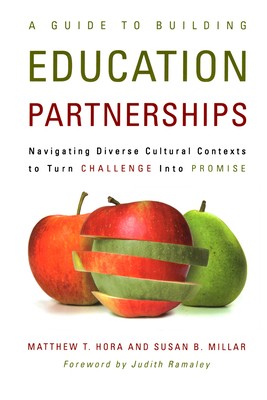
- We will send in 10–14 business days.
- Author: Matthew T Hora
- Publisher: Stylus Publishing (VA)
- ISBN-10: 1579224725
- ISBN-13: 9781579224721
- Format: 15.2 x 22.6 x 1.5 cm, softcover
- Language: English
- SAVE -10% with code: EXTRA
Reviews
Description
Education partnerships are central to - and often a requirement of - most education reform initiatives promoted by state and local governments, by foundations, and by business funders. Many fail for lack of understanding the dynamics of their complex relationships.
This book provides insights and guidance to enable prospective and existing education partners to develop answers to the questions that are critical to success: Why engage in this partnership? How can you communicate the potential benefits of partnership to motivate teachers, faculty, administrators, and community members? How do you select the best organizational structure and procedures for a partnership? How can you maintain open, deliberative discussion while respecting different histories and cultures? How can you produce compelling evidence that the partnership is worthwhile? The authors identify the principles that they consider critical to answering these questions. Rather than presenting a package of best practices, or a cookie-cutter approach, this book presents the organizational principles for planning and implementing education partnerships, along with sets of strategies for working through them.
EXTRA 10 % discount with code: EXTRA
The promotion ends in 17d.18:39:54
The discount code is valid when purchasing from 10 €. Discounts do not stack.
- Author: Matthew T Hora
- Publisher: Stylus Publishing (VA)
- ISBN-10: 1579224725
- ISBN-13: 9781579224721
- Format: 15.2 x 22.6 x 1.5 cm, softcover
- Language: English English
Education partnerships are central to - and often a requirement of - most education reform initiatives promoted by state and local governments, by foundations, and by business funders. Many fail for lack of understanding the dynamics of their complex relationships.
This book provides insights and guidance to enable prospective and existing education partners to develop answers to the questions that are critical to success: Why engage in this partnership? How can you communicate the potential benefits of partnership to motivate teachers, faculty, administrators, and community members? How do you select the best organizational structure and procedures for a partnership? How can you maintain open, deliberative discussion while respecting different histories and cultures? How can you produce compelling evidence that the partnership is worthwhile? The authors identify the principles that they consider critical to answering these questions. Rather than presenting a package of best practices, or a cookie-cutter approach, this book presents the organizational principles for planning and implementing education partnerships, along with sets of strategies for working through them.


Reviews